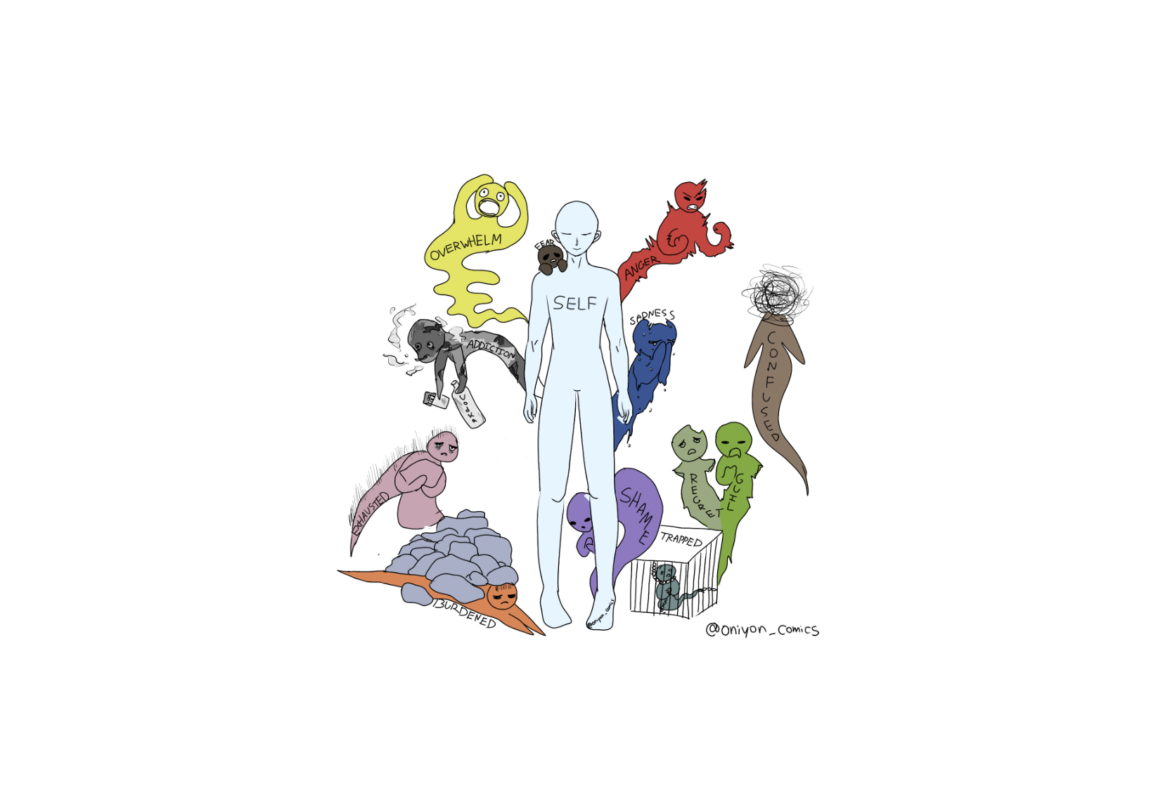
What is Internal Family Systems (IFS) therapy? Healing trauma by meeting your internal family
Have you ever felt like you were at war with yourself? Do you have different parts of yourself that seem to be in a constant battle? Maybe there’s a part of yourself that you wish you could just get rid of, but no matter how hard you try, it just won’t go away. Internal family systems therapy helps you to find internal calm and heal past trauma.
These inner conflicts can make you feel like you’re going crazy. But the truth is, you’re not crazy. Your nervous system has just been overwhelmed by traumatic experiences and it’s struggling to find balance. But there is hope. There’s a powerful and transformative approach to these inner conflicts that can lead to true healing and bring your nervous system back to its natural state of regulation.
The evidence-based trauma treatment called IFS (Internal Family Systems) therapy is a powerful and innovative approach to self-discovery that can help you understand and connect with the different parts of yourself in a whole new way. By learning to work with these parts, rather than against them, you can experience a deep sense of inner peace and self-love that you never thought possible.
Internal family systems therapy was developed by Dr. Richard Schwartz, who has been pioneering it in the US for 40 years. IFS therapy has been effective in helping people with trauma recovery, healing from relationship issues, anger issues, insomnia, addiction, trauma-bonded relationships, depression, anxiety, complex trauma, and much more. IFS recognizes that having multiple parts of ourselves is not a pathology, but a normal and healthy function of the mind. In Internal family systems therapy, you will identify your own “inner family” of parts, understand how each part is trying to help and protect you and restore balance and self-love through inner dialogue.
Below you get an idea of what it means to have a family of parts inside your head. Below are examples of different parts that a client of mine had including a part addicted to gaming, a part feeling shame, an overwhelmed part, an angry part, a part that’s stuck in a cage, and several others. However, these are just examples, as parts can manifest in various ways, such as voices in your head, feelings, or sensations in the body. There is no right or wrong way to experience parts within yourself. (Note: The client has given permission to share this information.)
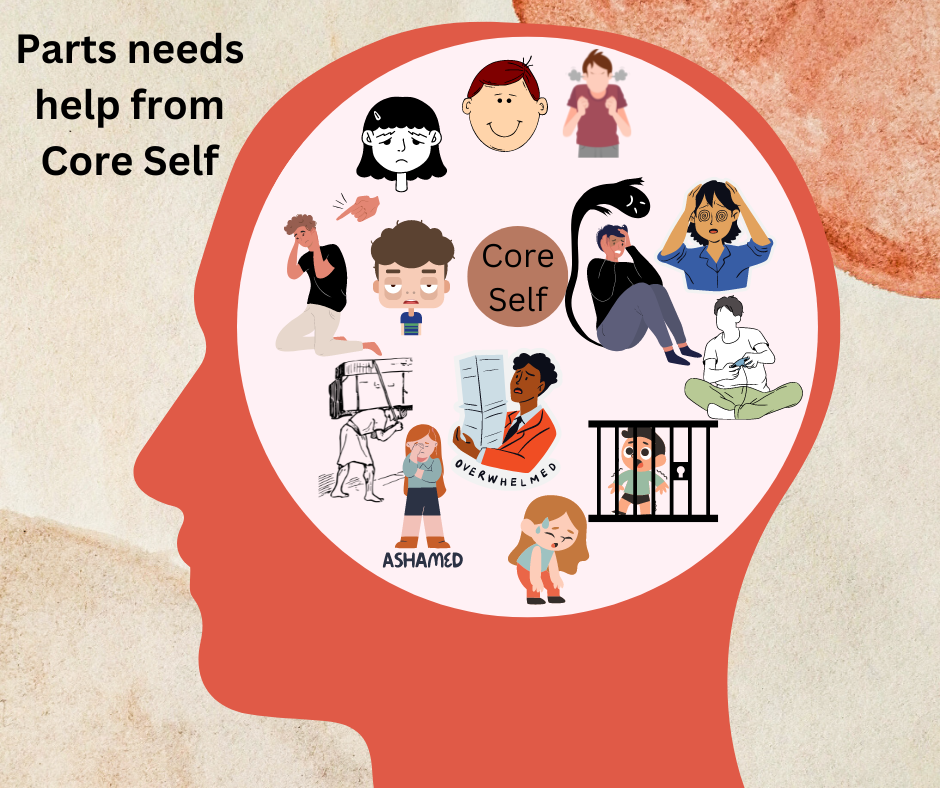
The true you is called Self in Internal Family Systems Therapy
You have a wise and compassionate leader within you that holds all of your different parts together and this compassionate leader is the only thing that is not a part. It’s like having a superhero inside of you that knows all your strengths and weaknesses and how to make all of your different parts work together for the greater good. This is the real you, your core self, and is referred to as “Self” or self-energy in Internal family systems. Self will help your parts to get the resolve they are looking for. But when we experience trauma, it can disrupt the flow of our self-energy and cause us to feel disconnected from ourselves and others. In IFS therapy, I will help you to access your self-energy and to connect with your parts from this energy. This is what is needed to heal from all kinds of trauma, including complex trauma.
Self-energy gives us the ability to be present, make decisions, feel our feelings, and be in relationships with others. The self consists of eight key attributes or qualities, often referred to as the 8 Cs in IFS.
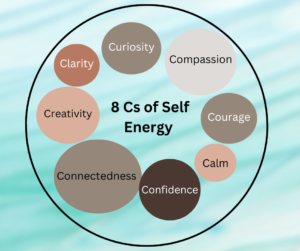
The 8 Cs are:
Calmness: Feeling peaceful, centered, and grounded. This is the foundation for all the other Cs.
Clarity: Having a clear sense of who you are and what you want. It is about seeing things clearly, both internally and externally.
Courage: Willingness to take risks, face your fears, and be true to yourself.
Curiosity: Exploring and learning about the parts within you and other people and parts within them.
Compassion: Being kind, understanding, and non-judgmental towards yourself and others.
Confidence: Having faith in yourself and your abilities.
Creativity: Open to new ideas and new ways of doing things, having access to your imagination.
Connection: Feeling connected to yourself, to others, and to the world around you. It is about feeling a sense of belonging.
The goal of Internal family systems therapy is to help you to access more self-energy (the 8 cs of Self), which allows you to make healthier choices and to have healthy relationships with others. Think about it, if you are able to access more of these 8 qualities in your day-to-day life, how would your life be different? IFS therapy helps you rewire your brain by connecting with parts of yourself with curiosity and compassion.
What does an Internal family systems therapy session look like? Protector parts
During an IFS therapy session, I work with clients to explore and gain insight into the different aspects of themselves. We use a curious and non-judgmental approach to understand the motivations and needs of these different parts. For example, you may have an “overachiever” part that believes its job is to achieve success, maintain financial stability and high status in their job, and avoid failure at all costs. Protector parts work very hard at their jobs and are very committed. The picture below illustrates what this process may look like. When you feel curious about a part of yourself (in this example a protector part who’s an overachiever), I will encourage you to approach it with an open and non-judgmental attitude by saying, “You are welcome here. I’m curious about you. Can you tell me more about yourself?” This will help initiate a conversation with that part. It may tell you “My job is to protect you from feeling rejected, criticized, and unloved.”

It continues to share with you that it developed this role as a child due to pressure from your mother to excel academically and professionally. Achieving success was how the overachiever made you gain her love and acceptance.
When you hear the story of your overachiever part and understand the reasons why it took on this role in your childhood, you will naturally feel compassion towards it. This part acted out of a need for your survival, believing that without love and acceptance from your mother, you would not be able to make it. As children, our survival depends on gaining the love and acceptance of our parents. When children are unable to succeed in this, even through changing themselves, children resort to creating a fantasy world in which their parents do love them.
Through the process of showing compassion and understanding to the overachiever part, it may be willing to release its role as a protector and allow itself to take a break. It can even take on a whole new role in your life. This can be imagined as the part taking a vacation, or simply telling you it wants to read books in a library! While this process takes place in the imagination, the physical and psychological relief, as well as the resulting changes in behavior, can be just as real as the beating of one’s own heart. Many of my clients have reported that they were suddenly drawn to an actual library, or felt compelled to start a new sport because a part expressed the need to do so in IFS therapy. These are just a few examples of how behaviors change in our day-to-day life because of IFS therapy and the impact it has on our brain, body, and well-being.
The role of protector parts in your life can manifest in other ways too, due to past trauma. Some examples include:
- A protector may trigger overeating as a coping mechanism to avoid sexual attention due to past trauma or body shaming experiences in childhood.
- Another protector may encourage overthinking to avoid difficult emotions. The logic may be “If you stay in your head at all times, you never have to feel anything.”
- Yet another protector may shut down your emotions and ability to think completely, to avoid feeling helpless or scared in confrontational situations.
- A protector may develop addictive behaviors in you (gaming, drinking, smoking, sex addiction, etc.) as a distraction from the inner pain of the exiles (see more on exiles below.)
These protector parts can express themselves as “symptoms” or coping mechanisms in your life such as numbing, eating disorders, chronic pain, depression, irritability, decreased concentration, insomnia, and more. The origins of these behaviors often stem from childhood as a way to cope with traumatic experiences. The eating disorder may have distracted you from the pain of low self-worth, the pain of loneliness and not feeling loved or understood by your caregivers. The irritability may have pushed everyone away and so helped you to not feel rejected by anyone.
Protectors are beautiful parts we all have inside us, doing a phenomenal job at keeping us alive, managing our pain, and not overwhelming us, especially as children. In IFS therapy you help protectors understand that roles they took on in the past to protect us from the pain of trauma, can be let go of now because the danger from the past is no longer present today. You can also help protectors to let you do their job once they trust that you are capable to do their job now because you are an adult now and not a child. You will also help protectors to let go of the burdens they have been carrying perhaps for decades, allowing them to adopt new, healthier roles.
Exiles and suppressed memories
When trauma occurs, it has a profound impact on your sense of self and your ability to function in the world. Traumatic events can be so overwhelming that the brain (protective parts) pushes aside the memories and feelings associated with the trauma in order to protect you from the pain of the memories. In Internal family systems therapy, the parts of you that carry these suppressed memories are referred to as “exiles.” In the picture below you see an example of how exiled parts can be locked up in your brain along with all the painful memories they carry. Outside the gate, you see an example of a protector part keeping the pain of the exiles from reaching you.
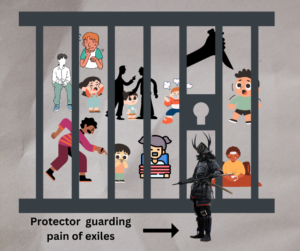
During a traumatic event, all aspects of the moment become frozen in time, including:
Physical sensations: The body may have experienced a freeze or flight response during the traumatic event.
Emotions: Emotions such as anger, shame, fear, or guilt may have been experienced during the traumatic event.
Actions: The individual’s own actions and the actions of others during the traumatic event are also frozen in time.
Beliefs: The beliefs the individual had about themselves and the world at the time of the trauma are also locked in place.
Even if protectors want you to forget these memories, the exiles will continue to call for you to return to them, release them from their burdens and bring them into the present moment with you.
The unburdening stage and what happens after
As you learn more about your different parts, you will reach the stage in Internal family systems therapy of unburdening the pain that parts of you carry. This means everything associated with your past traumas such as beliefs, body sensations, and intense feelings will no longer haunt you. The unburdening process in IFS leads to a reduction in whatever trauma symptoms you may be suffering from such as anxiety, depression, insomnia, addictions, and more of what I’ve mentioned above. Parts release their burdens by surrendering them to elements like fire, water, light, wind, or earth.
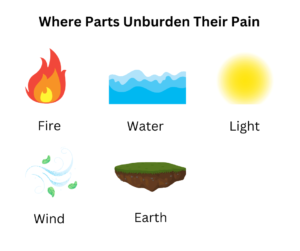
This results in the integration of formerly fragmented parts into a more unified and harmonious self, leading to greater balance and wholeness. The unburdening process in IFS therapy has been shown to significantly reduce symptoms of various conditions including but not limited to PTSD, anxiety, depression, and addiction. Clients have reported feeling less need to engage in behaviors such as addiction to gaming and instead, have discovered new interests and hobbies. Through Internal family systems therapy, clients have also been able to access suppressed memories from childhood and by doing so developed deeper self-compassion, leading to a calmer mind and body, improved relationships, reduced fear, and the ability to set healthy and strong boundaries.
In summary, IFS therapy is a form of evidence-based trauma treatment aimed at addressing inner conflicts and restoring balance to the nervous system. It was developed by Dr. Richard Schwartz over 40 years ago and has been used effectively to help people with a wide range of issues, including but not limited to addiction, trauma recovery, anger, depression, and anxiety. IFS recognizes that having multiple parts of oneself is normal and healthy, and helps individuals identify their own “inner family” of parts, understand how each part is trying to help and protect them and restore balance and self-love through inner dialogue. IFS welcomes all parts within us.
The core self, or “Self,” is the true essence of an individual, consisting of 8 attributes or qualities known as the 8 Cs: Calmness, Clarity, Courage, Curiosity, Compassion, Confidence, Creativity, and Connection. The goal of IFS therapy is to help individuals develop more self-energy and to make healthier choices and relationships. In a therapy session, I will work with you to explore your different parts and help you approach them with curiosity, compassion, and non-judgment. IFS helps you to resolve your inner conflicts, and childhood traumas, release stuck energy from your body, and give your body and mind long-awaited relief. It will help you to finally put the past in the past and give you a real chance of living in the present and being more at ease with your mind and body.
So Internal Family Systems Therapy can help you with, but is not limited to, the following:
1. Resolving enmeshment trauma and learning how to establish healthy boundaries in relationships. (To learn about enmeshment read this article 13 signs your relationship is enmeshed)
2. Dysfunctional relationships, including those within families and intimate partnerships.
3. Anger issues
4. Insomnia and other sleep disorders
5. Addiction
6. Break trauma-bonded relationships and heal for the abuse they cause
7. Depression
8. Anxiety
9. PTSD and C-Ptsd
10. Resolving inner conflicts
11. Making healthier choices
12. Building and keeping healthy relationships with others
13. Process trauma instead of re-living it
14. Getting to know yourself and your parts on a whole new level
15. Understanding yourself and people through an IFS lens
16. Helping parts even when you are not in therapy because you will learn how to identify their needs and motivations, and how to help them.
17. Feeling more connected with yourself, your body, and other people
18. Gain more clarity internally and externally (towards the world and people around you)
19. Gain the confidence and tools to deal with triggered parts of yourself with compassion
20. Decrease the frequency and severity of flashbacks and dissociative experiences
IFS therapy can be your chance to heal and recover from trauma. Take the first step in your healing journey with online therapy. No matter your location, I’m here to support you every step of the way. Reach out to me at https://khanselma.com/contact/ – I guarantee to reply within 24 hours.
All images are for illustration only. Parts can appear in any shape, form, or size. Some people can’t see parts and only sense them internally, while others hear parts communicate through words, voices, thoughts, or emotions. Even body sensations can be a way for parts to communicate. There’s no right or wrong way for parts to appear in your system. The images are just to help you understand what parts are and how they can work internally.
Do you know someone who can benefit from reading this article? Share it with them.
Lastly, if you would like to know more about Internal family systems therapy, you can read about it on the IFS institute page: https://ifs-institute.com/
With love,
Selma





Leave a Reply